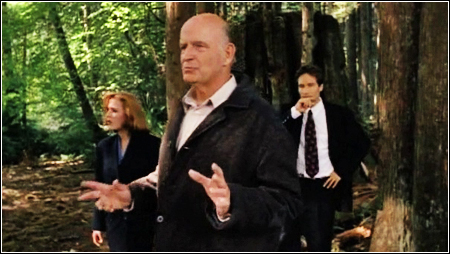
When I was growing up, I was obsessed with The X-Files, like wanting to be an FBI
agent level obsessed, like getting the “Scully” haircut level obsessed, like
Mulder and Scully action figure-owning obsessed (actually, I still have those).
So, that’s to say, it’s more than likely that I’ll return to more X episodes,
but for this first post on the show that influenced me a whole lot, I thought I’d
start with one single, perfect episode: “Clyde Bruckman’s Final Repose.” A note on these posts: because I’ll be
analyzing these works from a variety of angles and contexts, there will most
likely be spoilers within for the pieces that I am talking about. If you
haven’t seen/read them and wish to, avoid the post and come back later.
To begin, this isn’t even my
all-time favorite X episode (that would be “The Unnatural” which is one of the
greatest television—any show—episodes of all time). However, it is one of the
first episodes I ever saw and it is also one of the first that truly meant
something to me. For those of you who don’t know: The X-Files followed two FBI agents, Fox Mulder and Dana Scully,
working in an obscure unit of the FBI which investigates paranormal crimes.
Mulder is the hardcore believer and Scully is the skeptical scientist. You’ve,
I’m sure, seen the combination now down in countless other shows, but X did it
best. This particular episode, the fourth of the third season, follows the duo
as they investigate a slew of killings of psychics and meet one man, played
brilliantly by Peter Boyle, Clyde Bruckman who is an actual psychic---the catch
is that he can only see how people will die.
In terms of The X-Files, as a series, this was an
important episode for many reasons. It remains regarded as one of the best in
the series and it snagged the show’s only Emmy award for Writing (as well as a
guest actor award for Boyle). The writer of this episode, Darin Morgan, also
penned the equally classic “Jose Chung’s From Outer Space.”
The episode also is
important in that it is one of the few early episodes that offered a subtle role
reversal. Mulder is depicted as a skeptic (somewhat) in how he calls out celebrity
psychic Yappi, but more importantly Scully has a moment of beautifully veiled
belief. The very end of the episode shows off some of Gillian Anderson’s exquisite
acting as she realized that a vision Bruckman relayed to her is true, just not
in the way that she had taken it to mean.
In addition, this episode
matters to the wider genre of SFF because of its depiction of psychic abilities.
We are used to seeing movies and TV shows depict psychics who are frauds, but “oh
boy, what about this one real psychic!” twist. However, this episode takes that
spin in a different direction—both the killer and Bruckman are psychic, but
also both in highly specific ways. Bruckman can only see people’s deaths (a
skill he claims arose from becoming obsessed with the vagaries of chance
following the death of the Big Bopper) and the killer can only see himself
committing crimes but not why he’s doing it. Both fall victim to their own
powers. The killer kills because he sees himself doing so and doesn’t think
otherwise, Bruckman ends up dying because he feels that that’s what is supposed
to happen. What the episode seems to be saying is that everyone is a victim of
fate, even if they have the power to see it coming. In the killer’s case, its
madness to accept his fate of killing. In Bruckman’s case, it’s a kind of peace
(echoing a recurring dream he has of his own body decaying and returning him to
the earth).
Finally, the episode also
contains one of the most perfect moments on the show: when Scully takes the
bait and asks how she’ll die, Bruckman’s face glimmers for a second with real
delight (the first time we’ve seen all of the sadness completely leave his
face) and says that she doesn’t. Not only does this add to the show’s mythology—ie
is Scully immortal?—but also offers a moment of such strange hope, in an
episode filled with the futility of hope against fate, that one can’t help
being moved by it.